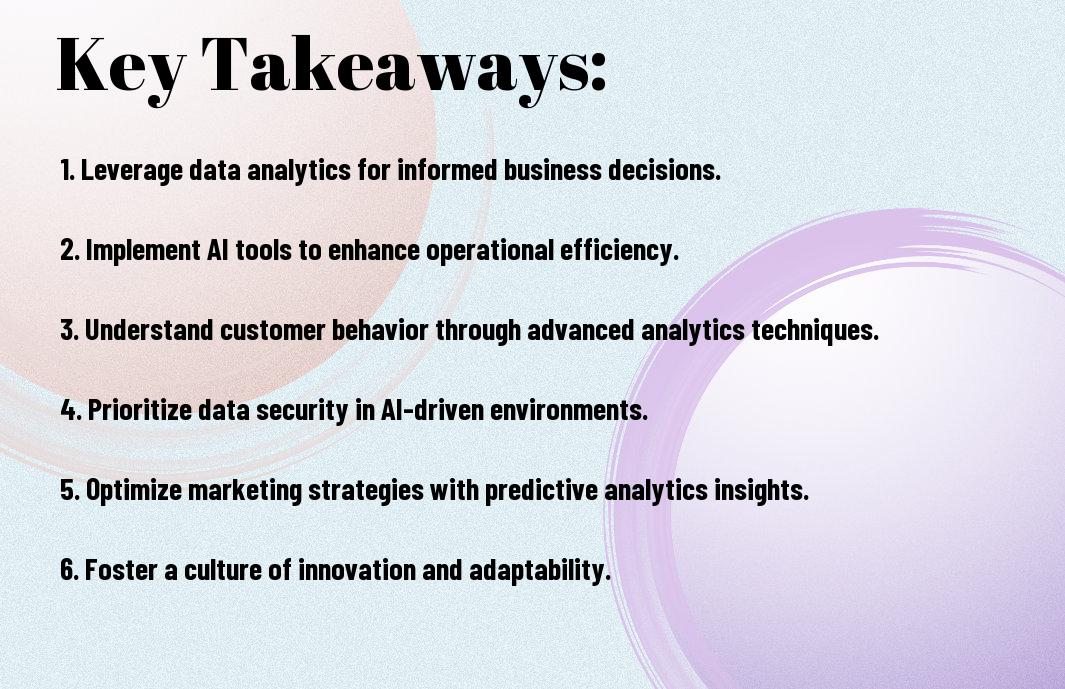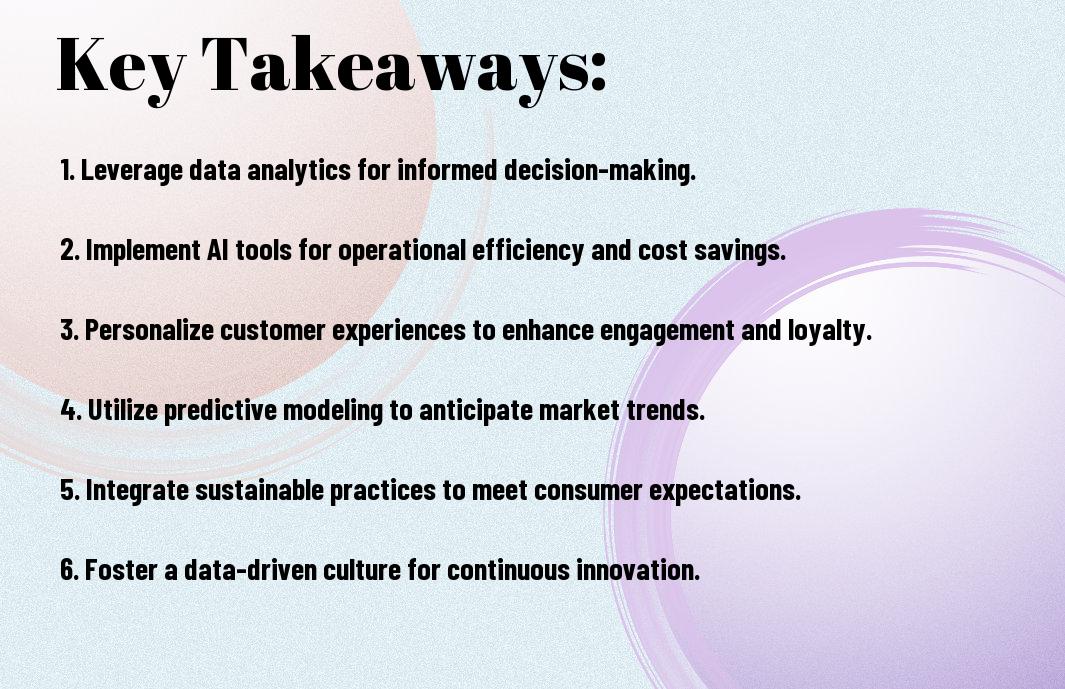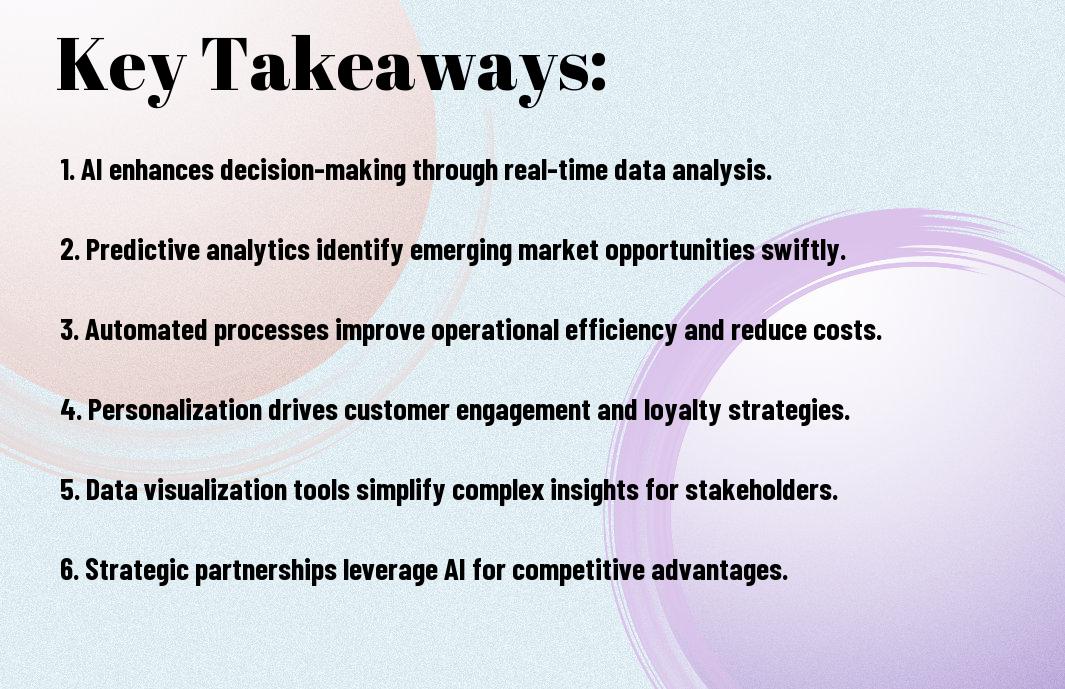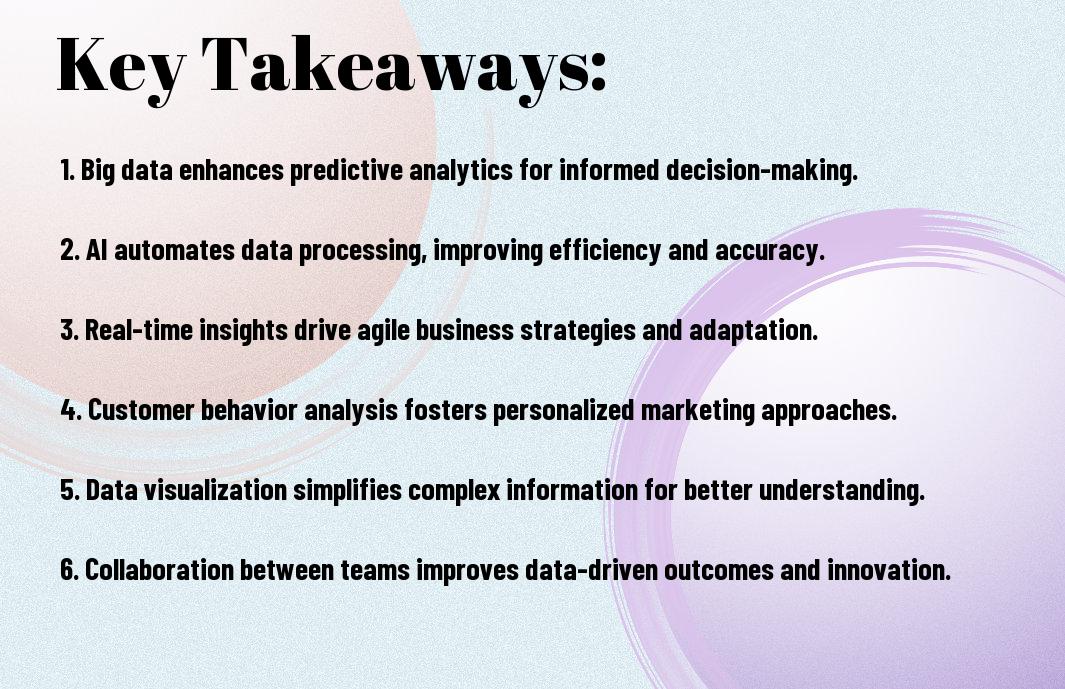As you navigate the complex landscape of entrepreneurship, you’re likely aware of the significance of informed decision-making. Your ability to make data-driven decisions can be the difference between success and failure. With the advent of Artificial Intelligence (AI), you now have the tools to analyze vast amounts of data and gain valuable insights. To learn more about AI’s Impact on Future Data-Driven Decisions, and discover how you can leverage AI to drive your business forward.
Key Takeaways:
- Utilizing AI in decision-making processes enables entrepreneurs to make informed choices, driven by data analysis and insights, which can lead to increased efficiency and profitability in their ventures.
- AI-powered tools provide entrepreneurs with the ability to process and analyze large amounts of data, identify patterns, and predict trends, giving them a competitive edge in the market and facilitating innovative solutions.
- By leveraging AI-driven data analysis, entrepreneurs can optimize their business strategies, mitigate risks, and capitalize on new opportunities, ultimately driving entrepreneurial success and wealth creation.
The Tipping Point of AI in Business
For entrepreneurs, understanding the impact of AI on business is vital for making informed decisions. You can leverage AI to analyze vast amounts of data, identify trends, and optimize operations, ultimately driving your business forward.
When Algorithms Become Game-Changers
Along with the rise of AI, you’ll notice significant improvements in your business’s efficiency and decision-making processes. You can utilize algorithms to automate tasks, predict customer behavior, and gain a competitive edge in the market.
The Small Data That Makes Big Differences
Differing from traditional data analysis, small data can provide valuable insights into your business’s specific needs and challenges. You can use this data to make targeted adjustments and improvements, leading to increased productivity and profitability.
Even with limited resources, you can still harness the power of small data to drive your business forward. You can start by collecting and analyzing data from various sources, such as customer feedback, sales reports, and website analytics, to identify areas for improvement and optimization, allowing you to make data-driven decisions that propel your business towards success.
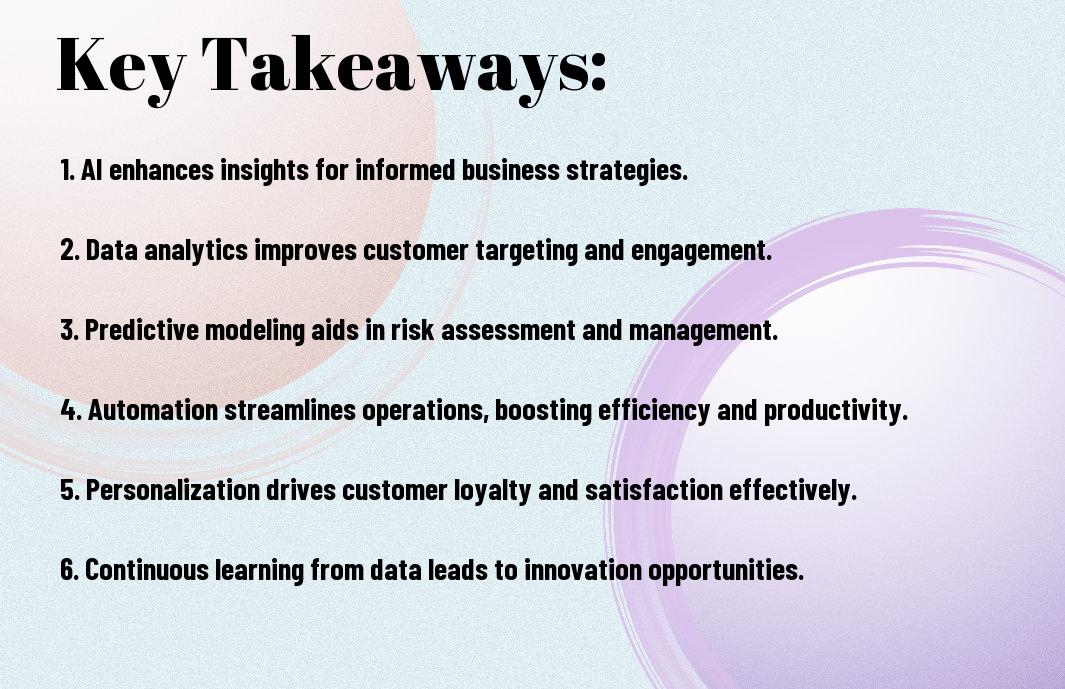
The Entrepreneurial AI Mindset
There’s a significant shift in your approach when you adopt an AI-driven mindset, enabling you to make informed decisions and drive your business forward with data-backed insights, ultimately leading to entrepreneurial success and wealth.
Pattern Recognition and Outlier Advantage
Beneath the surface of your business operations, AI helps you identify patterns and outliers, giving you a unique advantage in the market, allowing you to capitalize on opportunities that might have otherwise gone unnoticed, and make adjustments to optimize your strategy.
Decision Velocity as Competitive Edge
Among the key benefits of leveraging AI in your decision-making process is the ability to act swiftly, as you can analyze vast amounts of data in real-time, making it possible for you to respond to changes in the market faster than your competitors.
In addition, as you develop your decision velocity, you’ll find that your ability to adapt and evolve becomes a significant competitive edge, enabling you to stay ahead of the curve and make strategic decisions that drive your business forward, while your competitors are still analyzing the data, you’ll be executing and achieving your goals.
Wealth Creation Through Predictive Intelligence
Your ability to make informed decisions is significantly enhanced by AI-driven predictive intelligence, enabling you to identify opportunities and mitigate risks, ultimately leading to increased wealth creation.
From Reactive to Anticipatory Business Models
Besides traditional methods, you can now adopt anticipatory business models that leverage AI to forecast market trends and customer behavior, allowing you to stay ahead of the competition.
The New Economics of AI-Powered Ventures
Along with the rise of AI, you are witnessing a shift in the way businesses operate, with AI-powered ventures offering new revenue streams and unprecedented growth opportunities.
With the new economics of AI-powered ventures, you can scale your business more efficiently, reducing costs and increasing productivity, which in turn, can lead to significant returns on investment and long-term success, allowing you to achieve your entrepreneurial goals and create lasting wealth.
The Paradox of Automation and Human Insight
Many entrepreneurs are leveraging AI to drive business success, but you must understand the interplay between automation and human intuition to make informed decisions.
Where Machines Fall Short
Against the backdrop of increasing automation, you’ll find that machines lack the creativity and empathy that you bring to your business, making your insight invaluable.
The Symbiotic Relationship
Short of replacing human judgment entirely, AI augments your capabilities, freeing you to focus on high-level strategy and innovation, as you work together with machines to drive growth.
But as you research deeper into this symbiotic relationship, you’ll discover that AI can analyze vast amounts of data, providing you with actionable insights that inform your decision-making, while your expertise and experience help to contextualize and refine these insights, ultimately leading to more informed and effective decisions that drive your business forward.

AI Tools Reshaping Entrepreneurial Landscapes
Once again, you’re on the cusp of a significant shift in how you approach your business, as AI tools continue to revolutionize the entrepreneurial landscape, offering unprecedented opportunities for growth and innovation, enabling you to make data-driven decisions that drive your success.
Customer Acquisition Revolution
Revitalizing your approach to customer acquisition, AI-powered tools help you identify and target high-value customers, personalize your marketing efforts, and optimize your sales funnel, allowing you to reach new heights in your business, as you leverage these tools to fuel your entrepreneurial journey, you’ll find that your customer acquisition costs decrease while your conversion rates soar.
Operational Excellence Through Machine Learning
Around every corner, machine learning is transforming the way you operate your business, streamlining processes, and enhancing efficiency, as you harness the power of AI, you’ll be able to automate routine tasks, predict market trends, and make informed decisions that drive your business forward.
And as you probe deeper into the world of machine learning, you’ll discover that it’s not just about automation, but about gaining valuable insights into your business, allowing you to optimize your operations, reduce costs, and improve your bottom line, with machine learning, you’ll be able to analyze vast amounts of data, identify patterns, and make predictions that inform your strategic decisions, giving you a competitive edge in the market.
Ethical Considerations and Sustainable Growth
Not every entrepreneur considers the ethical implications of using AI in their business, but you must prioritize responsible practices to ensure long-term success.
Responsible AI Implementation
For instance, you should develop and implement AI systems that align with your values and promote transparency, allowing you to maintain control over your business decisions.
Building Trust in Automated Systems
Alike human relationships, you need to establish trust in your automated systems, which can be achieved by ensuring accountability and explainability in AI-driven decision-making processes.
At the core of building trust in automated systems is your ability to understand how AI algorithms make decisions and take actions, enabling you to identify potential biases and errors, and make adjustments accordingly, which ultimately leads to more reliable and sustainable business outcomes for you.
Summing up
With these considerations, you can harness the power of AI to drive your entrepreneurial success and wealth. By leveraging data-driven decisions, you will make informed choices, minimize risks, and maximize your returns. Your business will thrive as you capitalize on the insights and patterns uncovered by AI, giving you a competitive edge in the market and setting you up for long-term prosperity. You will be well on your way to achieving your goals and reaping the rewards of your endeavors.
FAQ
Q: What is the role of data-driven decisions in entrepreneurial success and wealth creation?
A: Data-driven decisions play a significant role in entrepreneurial success and wealth creation by enabling businesses to make informed decisions based on facts and trends, rather than intuition or guesswork. With the help of Artificial Intelligence (AI), entrepreneurs can analyze large amounts of data to identify patterns, predict market trends, and optimize their business strategies, ultimately leading to increased efficiency, productivity, and profitability.
Q: How does AI fuel data-driven decision making in entrepreneurship?
A: AI fuels data-driven decision making in entrepreneurship by providing advanced analytics and machine learning capabilities that can process and analyze vast amounts of data quickly and accurately. AI-powered tools can help entrepreneurs identify key performance indicators, detect anomalies, and predict future trends, enabling them to make data-driven decisions that drive business growth and success. Additionally, AI can automate routine tasks, freeing up entrepreneurs to focus on high-level strategic decision making.
Q: What are the benefits of using AI in data-driven decision making for entrepreneurs?
A: The benefits of using AI in data-driven decision making for entrepreneurs include improved accuracy and speed of decision making, enhanced customer insights, and increased operational efficiency. AI can also help entrepreneurs identify new business opportunities, optimize their marketing strategies, and improve their competitive edge. Furthermore, AI can provide entrepreneurs with real-time feedback and monitoring, enabling them to adjust their strategies and make adjustments as needed.
Q: How can entrepreneurs leverage AI to drive business growth and wealth creation?
A: Entrepreneurs can leverage AI to drive business growth and wealth creation by integrating AI-powered tools and technologies into their business operations. This can include using AI-powered chatbots to enhance customer service, implementing AI-driven marketing automation to optimize marketing campaigns, and utilizing AI-based predictive analytics to forecast sales and revenue. Additionally, entrepreneurs can use AI to identify new business opportunities, such as developing new products or services, or expanding into new markets.
Q: What are the potential challenges and limitations of using AI in data-driven decision making for entrepreneurs?
A: The potential challenges and limitations of using AI in data-driven decision making for entrepreneurs include the need for high-quality data, the risk of bias in AI algorithms, and the potential for over-reliance on technology. Additionally, entrepreneurs may face challenges in integrating AI into their existing business operations, and may require significant investment in AI infrastructure and talent. However, by being aware of these challenges and taking steps to address them, entrepreneurs can harness the power of AI to drive business growth, success, and wealth creation.

